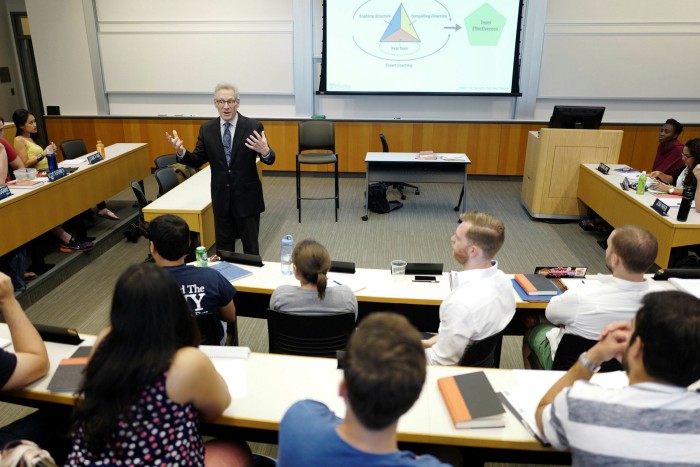How to make your MBA application stand out

Roula Khalaf, Editor of the FT, selects her favourite stories in this weekly newsletter.
Planning your application
DO plan your application well ahead of the deadline. An early application shows that you are a candidate who knows exactly what you want and are determined to study at the school of your choice, according to Jordi Robert-Ribes, chief executive of student review site EDUopinions. “You need to identify your preferred MBAs several months before the deadline,” he says.
DO send out requests for letters of recommendation as early as possible, says Brandon Kirby, senior director of marketing, sales and admissions at Rotterdam School of Management. “They’re one of the few parts of the process where the applicant cannot control the timing,” he notes. “There’s nothing worse than being ready to submit, but waiting on [letters] to come in, so let your recommenders know ahead of time and share any deadlines.”
DON’T use the same CV you would use for a job application, advises Amy Duckworth, director of admissions at Imperial College Business School in London. “Focus on highlighting impacts and achievements in each role held, rather than a job description,” she says. “Be sure to highlight promotions and career progression.”
DO submit your application early, especially if you hope to secure scholarship funding, adds Duckworth. “Securing your place early will give you more time to prepare, to network and meet your classmates early, and access the school’s careers service.”
FT Global MBA Ranking 2022 — top 100

Find out which schools are in our ranking of MBA degrees. Learn how the table was compiled and read the rest of our coverage at www.ft.com/mba.
DO remember that applying for an MBA is about finding the best fit for both you and the school, says Paula Amorim, MBA admissions director at Iese Business School in Barcelona. “Applying for an MBA is a process of you and the admissions committee getting to know each other,” she adds. “Do your research, taking time to reflect deeply on your motivations and how the specific business school can help you achieve your goals.”
Choosing an MBA and a school
DO consider criteria such as reputation, study programme, facilities, class size, location and career prospects, advises Robert-Ribes. If you are interested in entrepreneurship, for example, make sure the school you apply to has incubator programmes or professors active in the start-up world, able to deliver applied courses and useful connections.
DON’T rely on MBA student testimonials offered by the school, adds Robert-Ribes. Find verified student reviews, read other people’s experiences, compare programmes and find the right MBA for you. Don’t be swayed by the allure of a brand name but find schools and programmes that fit your personal learning style and career motivations.
DO follow the social media accounts of schools you are applying to, suggests Duckworth — LinkedIn and Instagram are good for showcasing what students and alumni are doing.
DO connect with current students, investigate MBA clubs and get a sense of the people who will be your classmates, friends and future network, urges Lisa Rios, assistant dean of MBA admissions at NYU Stern School of Business.
DO try to visit the campuses on your shortlist to get a sense of each school, its ethos and facilities, says Amorim.
Passing the standardised test
DO consider which standardised test is right for you, says Rios. NYU Stern takes an “applicant-centric” approach, offering students the opportunity to take the GMAT, GRE, Executive Assessment, LSAT and MCAT entry tests. “We prefer to offer test flexibility without compromising our ability to assess academic readiness”, Rios says.
DO check the application deadline and book a slot to take the required tests, urges Kentia Boulay, MBA director at Essec in France. “Don’t forget to factor in the time it will take to study for the tests.”
DO practise with sample questions, to help you identify your weaknesses and work on improving them, recommends Robert-Ribes.
DON’T get stressed while doing the exam, says Robert-Ribes. Use the optional eight-minute breaks, clear your mind and continue with the next question. “Remember, you can take the test up to five times per year,” he says. “So, no worries if you don’t get your preferred score the first time.”
Performing well at interview
DON’T say what you think the admissions committee wants to hear, advises Rios. “We really want you to be yourself, to be authentic, about your successes and what you want to do.”
DO prepare. “The interviewer has already reviewed the application and wants the conversation to go deeper than what is on the CV, and get to know you,” Rios adds.
DO ask as many questions as you can, ensuring that you express why you want this particular MBA, and your expectations, says Robert-Ribes. Remember that an interview is a two-way process and you are also interviewing the school to decide whether it is a good fit.
DON’T ask questions that are answered on the school’s website, warns Duckworth. “At Imperial, most of our MBA interviews are conducted by alumni — try to ask them insightful questions that will allow them to share their own experiences at the school.”
Writing a winning essay
DO spend more time thinking about the essay than actually writing it, recommends Kirby. “Start by taking a walk or something that will allow you to get lost in your thoughts,” he says. “Go beyond the first thing that comes to your mind. An MBA is a lot about self-reflection and this starts in the application process.”
DO showcase your emotional intelligence in your essay writing, says Rios. “The best candidates are those who possess both intellectual and interpersonal strengths. Those who develop great ideas can turn those ideas into action and inspire those around them.”
Comments